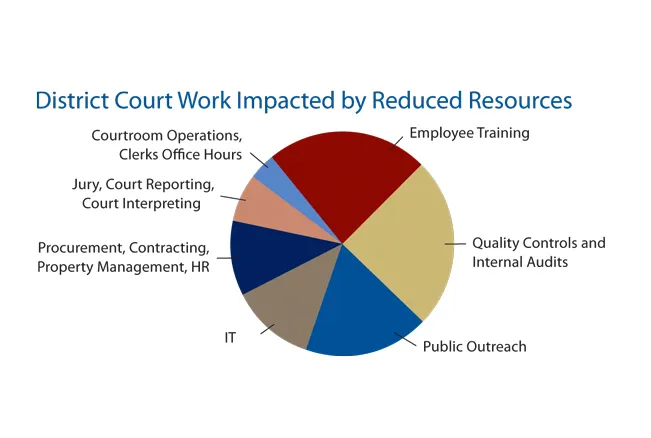
District Court Work Impacted by Reduced Resources
An informal survey of district court clerks shows courts are taking steps to adjust to reduced funding levels. Seventy-eight of 94 district clerks of court responded to the survey sent by the AO's District Clerks Advisory Group (DCAG) in conjunction with the District Court Administration Division of the Administrative Office.
"The District Clerks Advisory Group thought it was important to collect data and information regarding the impact that the 2012 budget levels are having on the operations of district clerks offices," said Clerk of Court Teresa Deppner, Southern District of West Virginia, and chair of the DCAG. "The Group believes that the collection of this information will provide a valuable resource for courts to rely upon as they make critical financial decisions. The Group also believes that empirical information on budget impact will be useful in the effort to explain to Congress the consequences of reduced funding levels."
Thirty-six percent of the courts responding reported salary shortages for fiscal year 2012 of up to $200,000. Two courts reported a shortfall greater than $1 million.
Nearly all responding courts are using a mix of reprogrammed funds and various personnel actions to offset current or anticipated reduced funding levels. Courts responding to the survey are using attrition, buyouts, early retirements, reductions-in-force, and furloughs to offset salary cuts. Courts are reprogramming funds from cyclical maintenance, tenant alterations, capital goods, and aggregate allotments to pay salaries.
Twenty-four courts responding reported that they will let up to three vacancies remain unfilled, 15 courts had no plans to fill four to six vacancies, and 28 courts reported seven or more unfilled vacancies.
Thirteen clerks' offices report they will use terminations to balance staff salary shortfalls. Of these, nearly all plan to terminate three or fewer employees. One court plans to terminate more than 10 employees.
Of the courts that have furloughed staff, one court reported furloughing over 101 staff members for one to three days, with staff allowed to choose their furlough days. Another court reported furloughing clerk's office staff—including those in management and supervisory positions—as well as court reporters and court interpreters.
Nearly half of the survey respondents (32) have offered early retirements to employees to reduce salary shortages. Twenty-three plan to offer early retirements to fewer than three employees.
Overall, the court clerks report that anticipated and actual reductions in resources will negatively affect training and employee development, public outreach, compilation of procedures manuals, quality control on case filings, IT services, and oversight of internal audits/controls.
Subscribe to News Updates
Subscribe to be notified when the news section is updated.
